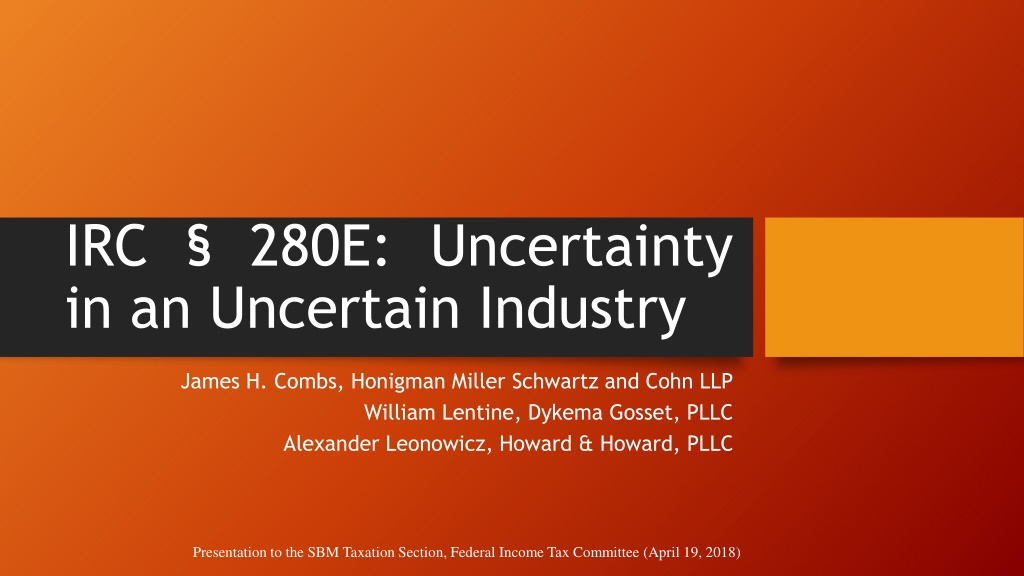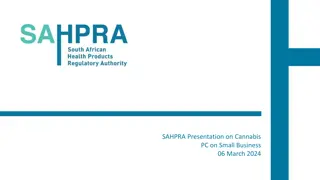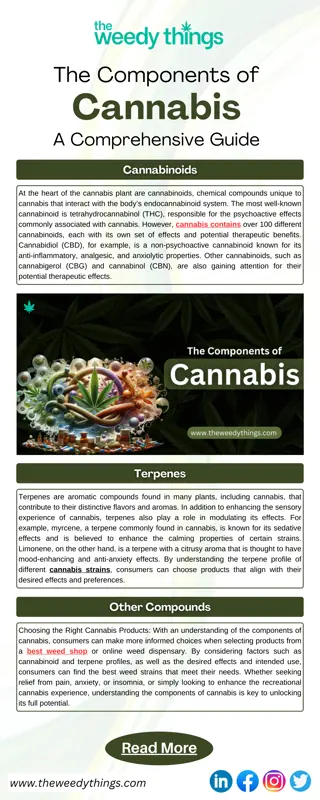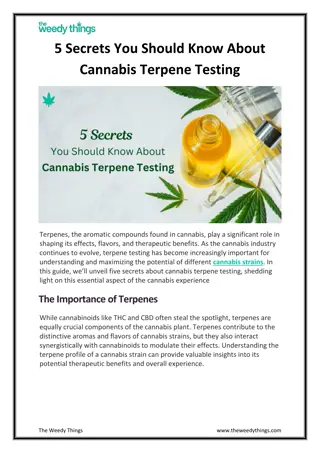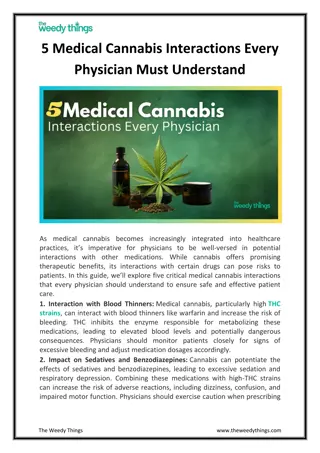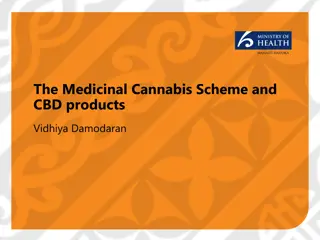Understanding IRC 280E in the Cannabis Industry
Explore the implications of IRC 280E on cannabis businesses, highlighting tax practitioner considerations, deductions limitations, and the history behind the enactment of this tax code. Learn about the impact of federal and state laws on deductions for businesses involved in the sale of controlled substances.
Download Presentation

Please find below an Image/Link to download the presentation.
The content on the website is provided AS IS for your information and personal use only. It may not be sold, licensed, or shared on other websites without obtaining consent from the author. Download presentation by click this link. If you encounter any issues during the download, it is possible that the publisher has removed the file from their server.
E N D
Presentation Transcript
IRC 280E: Uncertainty in an Uncertain Industry James H. Combs, Honigman Miller Schwartz and Cohn LLP William Lentine, Dykema Gosset, PLLC Alexander Leonowicz, Howard & Howard, PLLC Presentation to the SBM Taxation Section, Federal Income Tax Committee (April 19, 2018)
Non-Tax Background The Controlled Substances Act Schedule I of the CSA The first Cole memorandum October 19, 2009 The second Cole memorandum August 29, 2013 Rohrabacher-Blumenauer/Rohrabacher-Farr Revocation of the Cole memorandum January 4, 2018 2018 Federal Budget/Leahy Amendment Trump/Gardner Deal
Tax Practitioner Considerations Circular 230 State Bar pronouncements AICPA and MACPA Other
Taxation- Income and Deductions Generally IRC 61 includes in gross income all income from whatever source derived. Deductions from gross income include, without limitation: Amounts paid or incurred in carrying on a trade or business (IRC 162) Interest expense (IRC 163) Taxes (IRC 164) Depreciation (IRC 167) Research and experimental expenditures (IRC 174) A taxpayer may be permitted to take deductions relating to a trade or business even if that trade or business is illegal, absent a statutory prohibition or, in some cases, because the deductions are against public policy See, e.g., IRC 162(c)
Edmonson v. CIR, TC Memo 1981-623 The Tax Court permitted deductions of costs associated with running a business of selling illicit substances Deductions the court permitted included: COGS Telephone and car expenses Home office deduction Following the court decision in Edmonson, Congress enacted IRC 280E
IRC 280E 280E Expenditures in connection with the illegal sale of drugs. No deduction or credit shall be allowed for any amount paid or incurred during the taxable year in carrying on any trade or business if such trade or business (or the activities which comprise such trade or business) consists of trafficking in controlled substances (within the meaning of schedule I and II of the Controlled Substances Act) which is prohibited by Federal law or the law of any State in which such trade or business is conducted.
IRC 280E Breaking Down the Statute Applies to deductions and credits for amounts paid or incurred in carrying on a trade or business of trafficking or where there are activities that comprise a trade or business of trafficking IRC 7701(a)(25) states that paid or incurred shall be construed according to the taxpayer s method of accounting in computing taxable income No statutory definition of trafficking Relevance of use of the term in criminal statutes? See, e.g., 21 U.S.C. 841 (provision referred to as drug trafficking statute makes it unlawful to manufacture, distribute, or dispense, or possess with intent to manufacture, distribute, or dispense, a controlled substance ) (enacted in 1970) The controlled substance trafficking is illegal under federal or state law The statute does not mention cost of goods sold
IRC 280E COGS The legislative history addresses ability to take COGS into account: All deductions and credits for amounts paid or incurred in the illegal trafficking in drugs listed in the Controlled Substances Act are disallowed. To preclude possible challenges on constitutional grounds, the adjustment to gross receipts with respect to effective costs of goods sold is not affected by this provision of the bill. Note that COGS is an adjustment to gross receipts Compare IRC 161 and IRC 63
IRC 280E Schedule 1 of the CSA Schedule I of the Controlled Substances Act includes marijuana and does not distinguish between (i) hemp, (ii) CBD, or (iii) THC Nor is there any distinction between trafficking of controlled substances that is not legal under state law, state-legal medical marijuana and state-legal recreational marijuana If you traffic in a controlled substance listed on Schedule I of the CSA, IRC 280E applies
Recent Cannabis Cases IRC 280E and Related Californians Helping to Alleviate Medical Problems v. CIR, 128 T.C. 173 (2007) ( CHAMP ) Olive v. CIR, 72 F.3rd 1146 (9th Cir. 2015) Canna Care v. CIR, 694 Fed. Appx. 570 (9th Cir. 2017) Alpenglow Botanicals, LLC v. U.S., 2017 U.S. Dist. Lexis 65249 (D. Ct. Co. 2017) Edward A. Jabari, et ux. v. CIR, TC Memo 2017-238 Green Solution Retail, Inc. v. U.S. (certdenied March 19, 2018)
IRC 280E What is Trafficking? The CHAMP case defines trafficking as the sale of a controlled substance Engaging in caregiving at the same facility (and other facilities) as the sales activity was treated as a separate trade or business IRS is attempting to define trafficking more broadly not limiting the scope of the term to sales activity, but extending it to related activities How does trafficking apply to a transporter or a testing facility? Note that under Michigan licensing rules, a transporter does not take title to any cannabis products There are prohibitions on transfers or sales of cannabis by a testing facility to a person other than the party having the testing performed
IRC 280E Deductions Denied What types of deductions are covered by IRC 280E? Not limited to IRC 162 trade or business deductions The courts have applied to IRC 280E to non- IRC 162 deductions Does IRC 280E apply to IRC 199A?
Other Cannabis Guidance Rev. Proc. 2017-5 (no-rule list on determination letters relating to activities involving controlled substance activity) PLR 201615018 (final adverse determination revoking IRC 501(c)(3) status of entity with medical marijuana activity) CCA 201531016 (state tax treatment under IRC 280E) CCA 201504011 (inventory accounting under IRC 471/COGS) PLR 201333014 (no tax-exempt status for facilitating marijuana sales activity) PLR 201224036 (no tax-exempt status for advice on safe legal access to cannabis ) INFO 2011-0005 and 2011-0024 (IRS letters regarding no medical marijuana exception to IRC 280E)
Effects of the Tax Cuts and Jobs Act on IRC 280E New tax rates may make C corporations more relevant in entity considerations Different considerations now for flow-through entities Federal Corporate Income Tax Rate Michigan Corporate Income Tax Rate Dispensary Gross Receipts Tax Rate Sales/ Use Tax Rate Federal Shareholder Tax Rate (Dividends) Federal Individual Tax Rate (Ordinary Income) Michigan Individual Income Tax Rate Employer/ Employee Employment Taxes Self- Employment Tax Capital Gains Tax (Shareholder /Individual) Corporation 21% 6% 3% 6%* 23.8%/40.8% N/A 4.25%** 7.65%/7.65% N/A 23.8%/40.8% Pass-through N/A N/A 3% 6%* N/A 37%*** 4.25%** 7.65%/7.65% 15.3% 23.8%/40.8% Sole Proprietorship N/A N/A 3% 6%* N/A 37%*** 4.25%** 7.65%/7.65% 15.3% 23.8%/40.8% Includes the 3% gross receipts tax in the gross proceeds tax base ** Limitation on deductibility of state taxes by individuals *** Potential 20% deduction under IRC 199A with respect to qualified business income of pass-throughs/sole proprietorships
Tax Planning in Light of IRC 280E CHAMP and separate trades or businesses Multiple entities? Choice of Entity New Considerations in light of TCJA of 2017 Maximizing COGS; IRC 263A Management companies Seegenerally, Alternative Health Care Advocates, et al. v. CIR (T.C. Docket Nos. 16123-14, 8813, 15, 8852-15, 30186-14, 8850-15, 12321-15)
Other Considerations Minority investors, lenders and foreign investors Insurance Lack of after-tax cash flow Business combinations and exit strategies Canadian investments Cannabis REITs
Michigan Taxes on Cannabis R.A.B. 2018-2 addresses several state taxes imposed on cannabis businesses There is a 3% provisioning center tax that applies to the gross retail receipts of a provisioning center This is not limited to cannabis products and applies to paraphernalia, food, services, etc. Note impact on traditional tax planning under CHAMP The 6% sales tax applies to the gross proceeds from retail sales of tangible personal property The sales tax base includes gross proceeds attributable to the collection of the 3% provisioning center tax No exception for marijuana food products Prescription drug exception is not applicable The R.A.B. also addresses use tax related to medical caregiver transactions
Tax Remittance Issues Cannabis businesses are severely limited in their ability to access traditional financial services These access issues create tax remittance issues because the cannabis businesses operate primarily with cash This creates significant security issues The IRS has accommodated taxpayers in the cannabis industry by permitting them to make payments in cash even where there are electronic filing and payment obligations The Michigan R.A.B. on taxes imposed on the gross retail proceeds of marijuana provisioning centers and applicable sales and use taxes sets out tax payment procedures A specific form is required Payments may be made via cash or check
